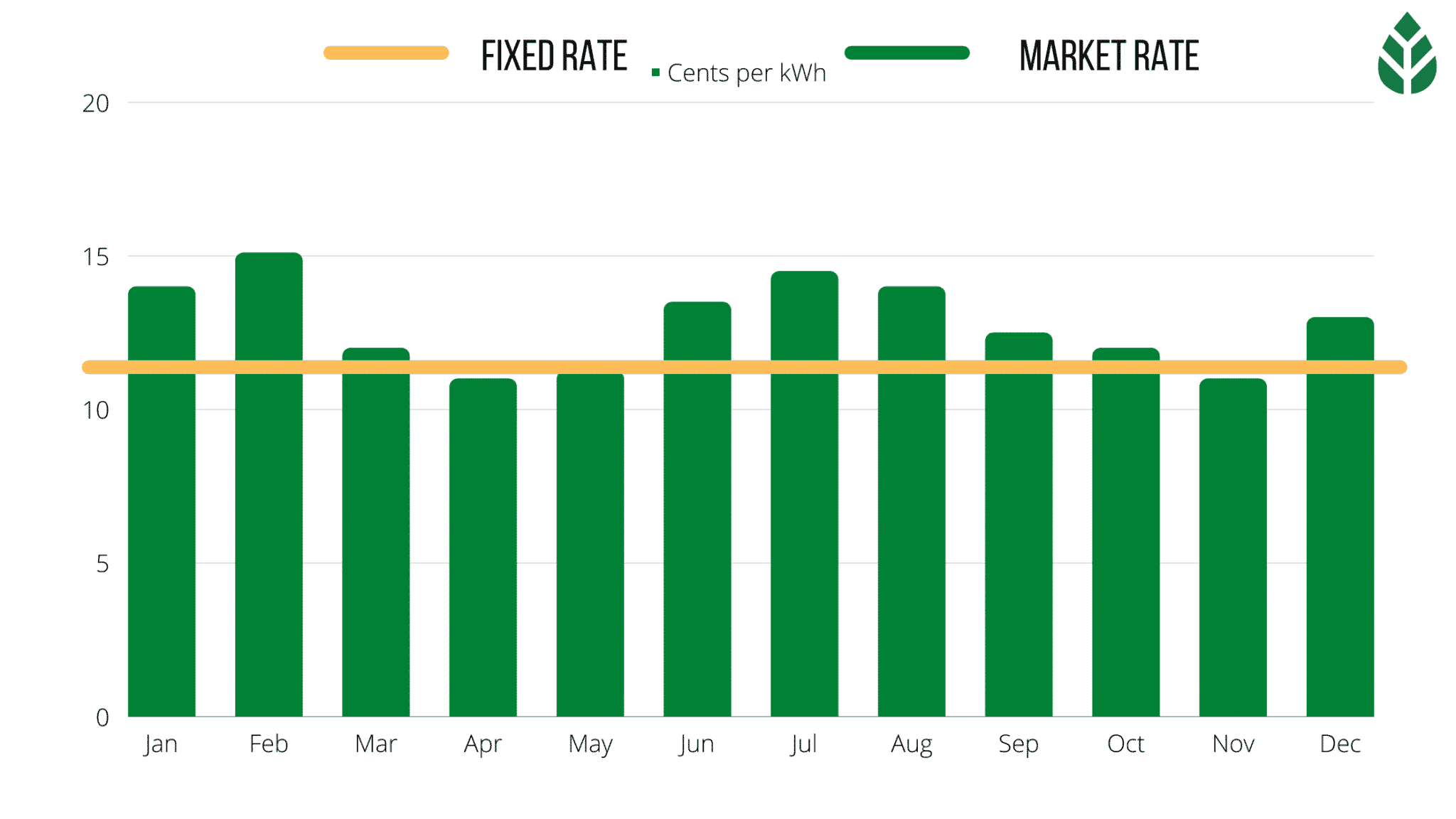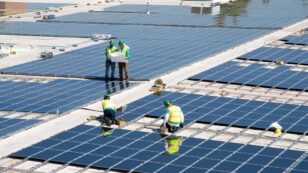 Culture
Culture
New York Electricity Rates and Providers (2024)
Here’s a quick overview of New York’s electricity rates:
- Current average retail rate of electricity: 21.20 cents per kilowatt hour1
- Current range of electricity prices in New York: 8.56 cents to 24.50 cents per kilowatt hour1
- Average monthly electric bill: $126.48
- Average energy usage: 602 kWh
**Information above verified as of [November 2022]
Each product and or company featured here has been independently selected by the writer. You can learn more about our review methodology here. If you make a purchase using the links included, we may earn commission.
In the 1990s, the state of New York had some of the highest residential electricity rates in the entire United States. Outdated equipment and infrastructure were the most salient culprits, but many factors contributed to the high electricity prices and poor quality of service.
To combat the increased energy rates for both residential and commercial customers, the state of New York opened up the energy market to increase provider competition and lower energy rates. By the early 2000s, every energy customer had the freedom to choose their desired energy company.
Since the restructuring of New York’s deregulated energy market, more than 200 independent energy service options have entered the industry. This high competition keeps New York’s energy rates lower and provides a plethora of options. To make the decision process easier, you can use this guide to the best electricity rates and providers in New York.
New York Energy Rates
The New York Public Service Commission (PUC) deregulated the state’s energy market in 1998, which meant that residents went from having to buy power from Consolidated Edison (more widely known as Con Edison, Con Ed or ConEd) to having the choice to select the energy service company (ESCO) that meets their needs best. Deregulated energy markets are generally better for customers because it encourages competition among suppliers, which tends to bring prices down.
The rate you pay for energy in NY depends primarily on the supplier you choose, which is the company that produces your power. However, it can also be influenced by the utility that delivers the electricity to you via the power lines. Most New Yorkers — and nearly all in the New York City (NYC) service area — buy power indirectly from Con Edison, but other major local electric utilities include:
- National Grid, New York State Electric & Gas (NYSEG) for customers in Rockland and Westchester Counties and throughout most of the state
- Central Hudson Gas & Electric
- KeySpan Long Island
- Rochester Gas & Electric (RG&E) in upstate New York
How Do New York Electricity Prices Compare Based On Company?
The table below provides a side-by-side comparison of the energy plans available in New York, including the contract term required and the price per kWh. It should be noted that, because we strive to help you make your lifestyle more environmentally friendly, we’re only including energy service companies that offer majority renewable energy plans. We’ll explain these plans and their benefits in greater depth below.
| Plan Name | Term (Months) | Plan Rate (¢/kWh) |
| City Power & Gas Premium Green 12 | 12 | 18.59 cents |
| City Power & Gas Classic Green 12 | 12 | 17.94 cents |
| City Power & Gas Premium Green 18 | 18 | 18.50 cents |
| City Power & Gas Classic Green 18 | 18 | 17.85 cents |
| City Power & Gas Premium Green 24 | 24 | 17.66 cents |
| City Power & Gas Classic Green 24 | 24 | 17.01 cents |
| City Power & Gas Premium Green 30 | 30 | 17.74 cents |
| City Power & Gas Classic Green 30 | 30 | 17.09 cents |
| Green Mountain Energy Company Pollution Free | 1 | 22.50 cents |
| Green Mountain Energy Company Pollution Free Farm to Market | 1 | 24.50 cents |
| Green Mountain Energy Company Pollution Free 24 | 24 | 20.00 cents |
| Green Mountain Energy Company Pollution Free 36 | 36 | 19.90 cents |
| IDT Energy Premium 100% | 8 | 23.32 cents |
| IDT Energy Premium 100% | 24 | 21.80 cents |
| Major Energy Electric Services New York Green 12 | 12 | 16.79 cents |
| Major Energy Electric Services New York Green 24 | 24 | 16.39 cents |
| Major Energy Electric Services New York Green 36 | 36 | 16.49 cents |
| Payless Energy 100% Green ConEd 12 | 12 | 19.15 cents |
| Payless Energy 100% Green ConEd 18 | 18 | 17.31 cents |
| Payless Energy 100% Green ConEd 24 | 24 | 17.16 cents |
| Payless Energy 100% Green ConEd 30 | 30 | 16.16 cents |
| Residents Energy 100% Premium 8 | 8 | 23.39 cents |
| Residents Energy 100% Premium 24 | 24 | 21.80 cents |
| Verde Energy USA New York New York Green 12 | 12 | 16.79 cents |
| Verde Energy USA New York New York Green 24 | 24 | 16.49 cents |
| Verde Energy USA New York New York Green 36 | 36 | 16.39 cents |
*All energy rates are accurate as of November 9, 2022 for 10002. Rates may have changed since the last update. For the most recent daily electricity rates in your area please enter your zip code above to get connected with a power supplier.
Get Connected to a Power Supplier in New York
Here at EcoWatch, we narrowed down the top clean-energy providers in the state. Start connecting with suppliers by using this tool or clicking the links below to compare prices and find the right plan for you.

Green Mountain Energy

Nationwide Service
Average cost
Pros
- Green-e certified plans
- Wide variety of contract term options
- Low number of customer complaints
- Many years of experience
- Makes charitable contributions
Cons
- Charges contract cancellation fees
- No prepaid or no-deposit plans
- No satisfaction guarantee
Green Mountain Energy has been serving and promoting the use of green energy on the East Coast since 1997. With stellar customer service, numerous online energy efficiency resources and an app-based account management system, Green Mountain Energy makes it easy for New York residents to make the switch to renewable energy.
Green Mountain Energy ensures its mission of sustainability is kept on track by booking a third-party auditor to evaluate its energy sources and electricity. These reports are made public so that every current and future client can have the peace of mind that this company is truly committed to sustainability and a greener future.
To back its claim of energy sustainability, Green Mountain Energy offers its customers access to several of its renewable energy certifications (RECs). Green Mountain Energy is proud of its carbon-free emissions and has its most recent Green-e Certification linked to its website.
Facts and Figures: Green Mountain Energy
| EcoWatch Rating |
|---|
| Better Business Bureau (BBB) Rating |
| Average Cost ($-$$$$$) |
| Solar Services |
| 4.5 |
| A+ |
| $$$ |
| 100% Renewable Energy Plans, Fixed-Rate Plans, Variable-Rate Plans, Home Solar, Month-to-Month Plans |

Verde Energy

Regional Service
Average cost
Pros
- No early termination fees
- Many years of experience
- Low rates
Cons
- History of issues with misleading marketing
- No prepaid plans
Verde Energy USA offers both affordable and sustainable energy for residents across New York. With its 100% renewable energy plans at fixed rates and excellent sign-on promotions, Verde Energy makes it easy for New Yorkers to go green and make energy choices that help lessen their carbon footprints.
Verde Energy USA now serves more than 250,000 residential and business customers, and many of these consumers report excellent customer service and energy savings. Unlike other energy providers, Verde Energy has no switch fees, no cancellation fees and requires no contract upon sign-up. This lets New York residents try green energy risk-free.
Facts and Figures: Verde Energy
| EcoWatch Rating |
|---|
| Better Business Bureau (BBB) Rating |
| Average Cost ($-$$$$$) |
| Solar Services |
| 4 |
| Not Rated |
| $$$ |
| 100% Renewable Energy Plans, Fixed-Rate Plans, Business Energy Plans |

PayLess Energy

Statewide Service
Average cost
Pros
- Wide variety of contract term options
- Wide variety of plan options
Cons
- Charges contract cancellation fees
- No prepaid or no-deposit plans
Payless Energy is a licensed Energy Service Company (ESCO) that helps New Yorkers find the most energy-efficient means to power their homes. With over 10 years of experience in the energy industry, Payless Energy is incredibly knowledgeable about the deregulation of New York’s electricity and strives to help its customers find the energy solutions that make the most sense for their homes.
Offering natural gas and electric services, Payless Energy claims to have rates that are better than 80% of its competitors. One service that makes Payless Energy a great option for New York residents is its energy auditing. Not only will Payless Energy use this audit to help reduce your electric bill, but it teachers consumers about ways to be more energy-efficient. Plus, Payless Energy also helps clients install solar panels on their roofs.
Facts and Figures: PayLess Energy
| EcoWatch Rating |
|---|
| Better Business Bureau (BBB) Rating |
| Average Cost ($-$$$$$) |
| Solar Services |
| 4 |
| Not Rated |
| $$$ |
| 100% Renewable Energy Plans, Fixed-Rate Plans, Variable-Rate Plans |
How Do You Find the Best Electricity Rates in New York?
Many New York residents assume that the energy plan with the lowest per-kWh rate is the right one for them, but there are other factors that should influence your decision. Below, we’ll explain how the energy consumption of your home, along with some finer details in your energy contract, can affect the price you pay for electricity and your overall satisfaction with the plan.
Your Energy Usage
The amount of electricity you use each month will have an effect on what you pay for electricity because most local utility companies use a tiered rate structure to determine your per-kWh rate. A tiered rate plan means that consumers who use different volumes of power will have different rates, usually with below-average or above-average consumption households having higher per-kWh prices. If you use well above or below the average NY consumption of 602 kWh per month, a tiered rate might end up costing you more than the average in your area.
Another option offered by some electric companies is the time-of-use (TOU) rate structure. These plans charge all customers the same amount, but the rate changes based on when energy is consumed. Your provider will have set off-peak times where energy rates are lowest, mid-peak times where they’re a bit higher and on-peak times when electricity is most expensive. If you use most of your electricity during off-peak hours, a TOU plan might be suitable for you, even if it comes at a slightly higher per-kWh rate.
Your Contract Length
The length of the contract you’re entering into with an energy plan is also a crucial factor to consider. Most fixed-rate plans require contracts, and they can vary in length from a few months to several years (usually a maximum of three years). Signing onto a contract means you’ll lock in a set rate regardless of local energy prices, which could end up being positive or negative depending on the customer’s viewpoint. Generally speaking, longer contracts come with lower rates.
You’ll also want to consider the fine print in the contract, which could include information about introductory rates that may increase during your contract term, sign-up fees, early-termination fees and more. If you’re unsure of which energy plan is right for you and your home, you can use this tool or the buttons below to help get started in the right direction.
Many of the best clean energy providers — such as Verde Energy USA — offer plans that require no cancellation fees or sign-up fees. The absence of these fees indicates that the energy provider is confident in its low prices and helps to make you feel better about switching to a new energy company.
What Types of Electricity Plans Are Offered in New York?
When you’re looking through energy plans in New York, you’ll likely come across some terminology that is unfamiliar, including the types of plans that are available. Below, we’ll explain some of the common types of energy plans you’ll find in New York to help you better understand which ones might work best for you.
Fixed-Rate Plans
Fixed-rate plans usually require a contract for up to three years, during which time the rate you pay per kWh remains exactly the same. Contrary to what some homeowners believe, your electric bill can still go up and down with fixed-rate plans, as the only portion of the contract that is fixed is the per-kWh price. If you have a month of higher consumption, your bill will be higher.
We typically recommend fixed-rate plans because they provide security that your energy rates won’t increase over time. Other options can have rates that spike during times of increased demand or low supply, so a fixed-rate plan is typically best for budgeting. However, they almost always require contracts, and most of them have early-termination fees.
Nearly all of our New York energy providers offer fixed-rate plans at contracts that last between six and 36 months. You may notice that the contracts with the longer terms have a per kWh price that is higher than the shorter terms. This is likely because the company anticipates electricity rates to increase, so you will likely save money over time even though the starting rate is higher.
| Pros of a Fixed-Rate Energy Plan | Cons of a Fixed-Rate Energy Plan |
| Make budgeting simpler | Require contracts and usually have early cancellation charges |
| Guarantee your energy price won’t increase during your contract term | Might end up being more costly than variable-rate options if local energy prices go down during your contract term |
Variable-Rate Plans
Variable-rate plans have per-kWh rates that change on a regular basis, depending on the local energy prices. The amount you pay for each kWh you consume could be different from month to month or even on a daily basis. Variable-rate plans often have the benefit of not requiring contracts, which means there are no early termination fees preventing you from switching energy providers should you want a lower rate.
However, we usually don’t recommend these plans because they can leave you with astronomically high energy bills if the local energy price skyrockets — and little peace of mind during times of crisis or high demand. Especially with how high New York energy rates can be, it is likely better to lock in a lower rate than risk variable rates.
| Pros of a Variable-Rate Energy Plan | Cons of a Variable-Rate Energy Plan |
| Have the potential to increase energy savings if local prices remain low | Your energy prices can fluctuate and increase unexpectedly |
| No contracts or termination fees | You might end up paying more than with a fixed-rate plan if local prices increase |
No-Deposit and Prepaid Energy Plans
Many electric companies in New York require some type of deposit or sign-up fee to enroll in an energy plan, which is a way to offset the risk of future non-payment. Some New York utility providers offer no-deposit plans for customers who can pass a credit check, which can save you some money on upfront electricity costs. These plans can also have variable or fixed rates, so you can choose the plan that’s right for you.
Another option to reduce initial costs is a prepaid energy plan. These don’t require a deposit because you instead put money into an energy account, which will be drawn from to cover your power consumption. You have to remember to top up the account to avoid power outages, but these plans offer a guaranteed way to limit how much you spend on electricity each month.
| Pros of a Prepaid Energy Plan | Cons of a Prepaid Energy Plan |
| Little to no money down required | You have to remember to add money to your account each month |
| You retain total control over energy expenses | Some prepaid plans come with slightly higher rates |
| No contracts or early cancellation fees |
Green Energy Plans
Many electric suppliers in New York purchase fossil fuels like natural gas and coal to provide energy for customers, but green energy plans instead purchase or support renewable energy like wind and solar. We always recommend these plans because they let you support green energy without having to spend thousands on solar panels, and they help reduce your carbon footprint and the pollution your energy consumption creates.
New York established the Clean Energy Standard, which sets a Renewable Portfolio Standard (RPS) goal of producing an incredible 70% of its electricity via clean energy sources by 2030.1 Although green energy plans are already widely available and affordable, it’s possible that the state will further incentivize green energy plans and reduce the cost of clean energy even more.
| Pros of a Green Energy Plan | Cons of a Green Energy Plan |
| Lets you support the green energy movement with minimal cost | Slightly more expensive on average (1 to 2 cents more per kWh) |
| Reduces your carbon footprint and contribution to global warming | Not as many plans available |
Business Energy Plans
Finally, business energy plans are designed for commercial customers that have greater energy needs than residential customers. These plans can be fixed-rate or variable-rate and can also be 100% renewable energy plans.
According to the U.S. Energy Information Administration2, commercial, industrial and transportation electricity prices tend to be lower than residential. This price difference is likely because businesses are expected to consume significantly more energy than the average New York household.
Energy providers often service both residential and commercial clients, so you can get a business energy plan from top providers that specialize in commercial and office electricity, such as Payless Energy.
What Should You Look For When Choosing an Electricity Provider In New York?
Whether you are a new resident in New York or are a current resident who is unhappy with your current electricity prices, you can explore various energy companies to find the best electricity rates available. It’s important to consider the following factors as you research the top energy providers in New York:
- Customer reviews
- Company history in your neighborhood
- Electricity rates
- Type of energy plan
- Energy sources
Picking Energy Providers As A New New York Resident
If you are new to New York, then you will have to do plenty of research before you decide on an electricity plan and provider that is right for your home. Especially if you are moving from a state that has not deregulated electricity, then the concept of choosing your own energy provider may seem like a daunting task.
The best first step is to talk to the previous owner of your new home, your landlord or your neighbors. Next, you should focus on researching the following factors:
- Customer reviews: A lot can be learned from what actual consumers have experienced. To learn the most about how an energy company performs in your neighborhood, look through both positive and negative customer reviews
- Company history in your neighborhood: Not all energy companies operate in every neighborhood and some companies may have more experience in your area than others. It may be beneficial to find a company that has a wide network in your area because there’s a good chance you’ll get quicker service should something go wrong
- Electricity rates: Electricity price is one of the most important factors for most homeowners, so look at several companies and compare energy rates before you make your decision
Selecting an Energy Provider If You Are Switching Providers in New York
As a current New York resident, you likely have some insight into the most used energy providers in your neighborhood. So you may not need to do as much research as someone who is moving to New York for the first time. However, you should pay attention to rates, types of plans and energy sources.
- Electricity rate: If you are unhappy with your current energy provider, there’s a good chance it has to do with the price you pay for energy. Compare other electricity rates that are offered by local providers
- Type of energy plan: If you had chosen a short six-month contract, you may be interested in a long-term contract that offers a lower fixed rate. Research the plans that are offered by your current energy provider and others in your area
- Energy source: You should research where your state gets its energy. Many New York energy providers offer 100% renewable energy plans that utilize wind and solar energy to power your home
Who Offers Green Energy Plans in New York?
When you opt into a 100% renewable energy plan, it doesn’t always mean that the electricity powering your home comes directly from solar or wind farms. Rather, each kWh of electricity that you pull from the grid is offset by your REP in another place. That said, these energy plans are better for the environment and reduce your carbon footprint.
You may get your energy from wind energy, hydroelectric energy, solar energy and more. Even though these are all renewable sources, not every renewable energy plan is a green energy plan, so look for energy plans that utilize wind or solar energy as these are both examples of green energy.
What Are The Best Electricity Companies and Providers in New York?
There are lots of electric companies in New York to choose from, thanks to the deregulation of the energy market. No single company will be best for all homeowners, but the below suppliers rank highest in our top-rated electric companies in New York.
Green Mountain Energy Company: Best Green Energy Options
- Positive customer reviews
- 100% renewable energy plans
- Fixed-rate options available
- Multiple contract rate options offered
| Plan Name | Contract Length | Average Rate |
| Green Mountain Energy Company Pollution Free | 1 | 22.50 cents |
| Green Mountain Energy Company Pollution Free Farm to Market | 1 | 24.50 cents |
| Green Mountain Energy Company Pollution Free 24 | 24 | 20.00 cents |
| Green Mountain Energy Company Pollution Free 36 | 36 | 19.90 cents |
Verde Energy USA New York: Best Value for Renewable Energy
- Positive online reviews
- 100% renewable energy plan options
- Several contract terms to choose from
- Fixed-rate plans are standard
| Plan Name | Contract Length | Average Rate |
| Verde Energy USA New York New York Green 12 | 12 | 16.79 cents |
| Verde Energy USA New York New York Green 24 | 24 | 16.49 cents |
| Verde Energy USA New York New York Green 36 | 36 | 16.39 cents |
Payless Energy: Great Local Provider
- Green energy plans available
- Positive online customer reviews
- Fixed-rate plans
- Many options for contract term offered
| Plan Name | Contract Length | Average Rate |
| Payless Energy 100% Green ConEd 12 | 12 | 19.15 cents |
| Payless Energy 100% Green ConEd 18 | 18 | 17.31 cents |
| Payless Energy 100% Green ConEd 24 | 24 | 17.16 cents |
| Payless Energy 100% Green ConEd 30 | 30 | 16.16 cents |
Residents Energy: Great Regional Provider
- Fixed-rate plan options available
- Green energy plans offered
- Different contract term options
| Plan Name | Contract Length | Average Rate |
| Residents Energy 100% Premium 8 | 8 | 23.39 cents |
| Residents Energy 100% Premium 24 | 24 | 21.80 cents |
FAQ: New York Electricity Plans
At EcoWatch, we frequently get questions about how to choose a new energy plan in New York. Below are some of the questions we see most often, along with our responses.
Of all of the electric suppliers in New York that offer 100%-renewable energy plans, two companies tie for the lowest energy rates. Verde Energy USA has fixed-rate plans with rates as low as 16.39 cents for its 36-month plan, and Major Energy Electric Services has a green energy plan that also costs 16.39 cents per kWh. Compared to the current average cost of energy in New York of 21.20 cents per kWh, these plans provide massive savings and the opportunity to support renewable energy.
There is no single electric supplier in New York that will suit everyone, but one of our top-rated NY energy companies is Green Mountain Energy Company. This supplier maintains outstanding customer reviews, provides green energy plans at fixed rates and has several different contract terms available to allow customers to choose what works best for them.
The average New Yorker pays $126.48 per month for electricity, according to the Energy Information Administration (EIA). This is above the national average and the average price for the northeast. According to the most recent data sources for these figures, the typical monthly consumption is 602 kWh, and the average energy price is 21.20 cents per kWh.
Since New York has a deregulated energy market, the easiest way to lower your electric bill is to choose a new energy plan with a supplier that has lower rates. Without doing anything else, switching to a more suitable supplier can significantly affect your monthly bill and provide energy savings almost immediately.
Additionally, you can improve the energy efficiency of your home. Most homeowners do this by using the tips in our guide to home energy efficiency, which includes updating windows, doors and insulation, installing a smart thermostat and upgrading to energy-efficient light bulbs.
There is no single energy plan that will be ideal for all New Yorkers. Rather, you should decide which type of plan works for you, the contract term you’re comfortable with, and the rate you’re willing to pay within those parameters. You can start by using this tool to help find the ideal plan for your needs, or you can check out green plans from Green Mountain Energy Company, Verde Energy USA New York, Payless Energy and Residents Energy to get started.

 233k
233k  41k
41k  Subscribe
Subscribe 







